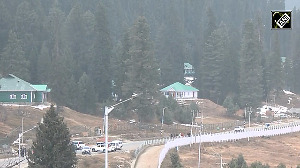"The trip to India and Thailand, in one sense, is Clinton's way of literally and figuratively distancing herself from Obama, her way of letting us know she has better policies for dealing with Beijing," wrote Forbes columnists Gordon G Chang.
Author of the book The Coming Collapse of China, Gordon said that during her recent visit to India, Clinton devoted most of her time to relationship-building events.
"Clinton's concept of siding with another large democracy seems much more attractive -- and sustainable," he wrote, adding most important, the US and India share values.
"Former Japanese Prime Minister Shinzo Abe recognised the natural relationship between Washington and New Delhi when he proposed in 2007 that these two nations join Australia and Japan in an 'arc of freedom and prosperity.'
"The idea got nowhere at the time, when the US had hope that China could become a 'responsible stakeholder' in the international system, but now it is becoming clear that the Chinese are not able -- or interested -- in assuming such a role," Gordon said.
Noting that by all accounts, her charm, wit and personal diplomacy won friends for the US, he said she left Washington amid reports of intense infighting with a White House intent on marginalizing her role.
"Real policymaking power, some say, is now exercised by a small West Wing group centered on Chief of Staff Rahm Emanuel," the column said.
In response she has been on the attack, tarring President Obama through intermediaries.
"This week, for instance, one of her State Department aides has argued in off-the-record conversations that Obama has been making a series of foreign policy blunders, among them letting the Chinese do whatever they want and giving them more than they ask for. The trip to India and Thailand, in one sense, is Clinton's way of literally and figuratively distancing herself from Obama, her way of letting us know she has better policies for dealing with Beijing," it said.
Though it is not the way to conduct foreign policy, Gordon wrote it was virtually inevitable that Obama and Clinton would try to undermine each other.
"And in any event, the president needed a better China policy, and hers will definitely be more effective. To the extent the White House saw the need to hedge against China, it looked to Russia. That, in a sentence, is what the president's trip to Moscow this month was all about," it said.
"Yet the president needs to think about why we have to be wary about Beijing in the first place. It is not because China is large, rising or has the potential to become a peer competitor. It is because the nature of China's government -- an insecure one-party regime -- makes it an unreliable partner," the Forbes column added.





